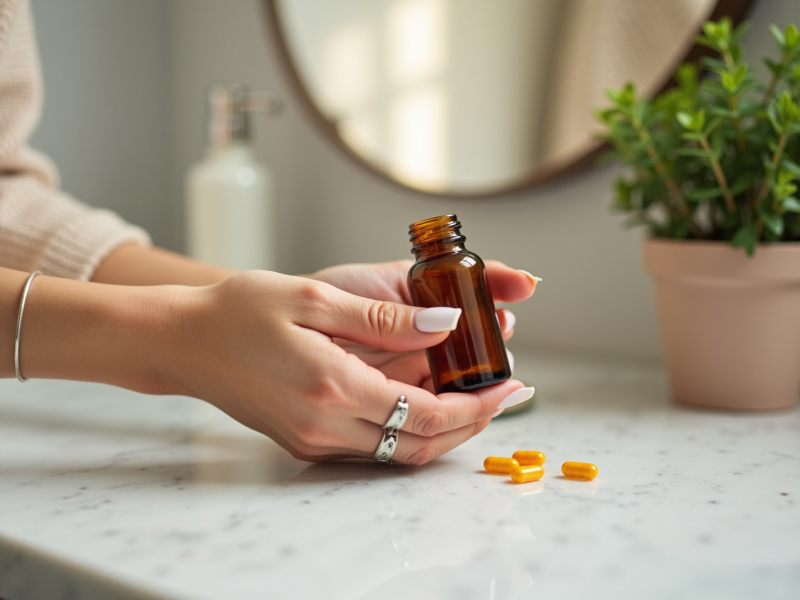Overview
The article examines the influence of the DHEA hormone on hair loss in women, indicating that variations in DHEA levels can contribute to conditions such as androgenetic alopecia. It elaborates on how increased hormone levels can amplify androgen activity, resulting in hair thinning. Additionally, the article notes that DHEA supplementation may enhance hair density in certain cases. This underscores the necessity for careful monitoring and tailored approaches to hormonal health.
Introduction
Understanding the complexities of hormonal health is essential, particularly for women navigating the challenges of aging and hormonal fluctuations. Dehydroepiandrosterone (DHEA) is a crucial hormone produced by the adrenal glands, significantly influencing various aspects of women’s health, from mood to hair vitality. However, as DHEA levels decline with age, many women confront the unsettling reality of hair loss. This raises important questions about the hormone’s impact on scalp health and overall well-being.
To address these concerns, it is vital to explore strategies for balancing DHEA levels and mitigating hair thinning, enabling women to make informed choices regarding supplementation and lifestyle adjustments.
Define DHEA and Its Role in Women’s Health
Dehydroepiandrosterone is a steroid hormone produced by the adrenal glands, acting as a precursor to both estrogen and testosterone. Hormone concentrations peak in early adulthood but significantly decline with age, particularly impacting women during perimenopause and menopause. This decrease is linked to various , such as mood fluctuations, reduced libido, and changes in body composition. Research indicates that lower hormone levels may contribute to symptoms like exhaustion and diminished vitality, which are common during these transitional phases.
Maintaining balanced hormone levels is essential for overall well-being and metabolic function. Studies have shown that hormone supplementation can enhance sexual desire and fulfillment in women experiencing low libido, especially during perimenopause. However, the effectiveness of this supplementation for alleviating menopause symptoms remains uncertain, with a 2022 meta-analysis revealing no consistent benefits for menopause-related issues. Moreover, high doses of dehydroepiandrosterone can result in side effects, including acne, irritability, hormonal imbalances, and dhea hormone hair loss, highlighting the necessity of medical supervision when considering supplementation.
Case studies underscore the potential of dehydroepiandrosterone to support bone density, which is vital for counteracting estrogen loss and reducing osteoporosis risk. Additionally, both topical and oral formulations of dehydroepiandrosterone have been recognized for their ability to improve skin hydration and elasticity, making them appealing for anti-aging purposes. It is crucial to acknowledge that this supplement may pose risks for individuals with a history of breast, ovarian, or uterine cancer due to its involvement in estrogen and testosterone production. As interest in hormonal balance grows, understanding the role of this hormone becomes increasingly important for individuals navigating the complexities of hormonal changes, enabling them to make informed health decisions.
Explore the Connection Between DHEA and Hair Loss
Studies suggest that this compound significantly influences hair loss in females, primarily through its conversion into androgens like testosterone. Elevated concentrations of certain hormones can enhance androgen activity, leading to thinning or loss of hair, particularly in individuals predisposed to androgenetic alopecia. Approximately 30 million women in the U.S. are affected by this condition, with female pattern baldness (FPBL) impacting about 40% of women by age 50. Furthermore, hormonal fluctuations during menopause can exacerbate the issue.
Conversely, some studies indicate that supplementation of specific hormones may improve follicle density in certain situations, especially when hormonal levels are closely monitored. Notably, DHEA hormone hair loss is reversible in most cases, particularly those triggered by telogen effluvium, providing hope for individuals concerned about thinning. Individual responses to DHEA can vary significantly based on genetic predisposition, existing hormonal balance, and overall health.
For instance, a retrospective study revealed that 74.3% of individuals undergoing spironolactone treatment for female pattern thinning reported stabilization or enhancement, suggesting that hormonal management can yield favorable outcomes. Dr. Robert Koppel emphasizes the psychosocial effects of hair loss, indicating that it can lead to depression and feelings of worthlessness.
Understanding the intricate relationship between is crucial for those experiencing hormonal changes, particularly in the context of dhea hormone hair loss, as it can inform more effective management strategies for preserving hair density and overall wellness.
Identify Side Effects and Risks of DHEA Supplementation
This supplementation, while potentially beneficial, carries significant risks that women should be aware of. Common side effects include acne, oily skin, and dhea hormone hair loss, along with changes in menstrual cycles. More concerning are the serious implications associated with hormone-sensitive cancers, such as breast and ovarian cancer. Research indicates that this hormone may increase the risk of these conditions, particularly in individuals with a history of hormone-related issues. Studies have shown that hormone supplementation can elevate hormone levels, potentially exacerbating existing health concerns. Therefore, those with such backgrounds should carefully consider this supplement and seek personalized advice from healthcare professionals.
Moreover, quality control in these supplements is a critical issue, as many products may not contain the ingredients their labels claim. This variability can affect both efficacy and safety, making it crucial for women to . The long-term effects of this supplementation are largely unknown, underscoring the importance of considering individual health profiles before initiating any new supplement regimen. Experts stress that medical supervision is vital, especially for individuals experiencing dhea hormone hair loss and those with underlying health conditions. As Dr. Norbert Gleicher noted, ‘DHEA supplementation should only be taken under physician supervision,’ highlighting the need for careful monitoring of hormone levels. Given the potential for adverse effects, including the aggravation of hormone-sensitive conditions, individuals are encouraged to weigh the benefits against the risks and consult healthcare professionals to make informed decisions regarding the use of this supplement.
Implement Strategies for Managing DHEA Levels and Hair Health
To effectively manage DHEA levels and support hair health, women can adopt several key strategies:
- Balanced Diet: Focus on a diet rich in healthy fats, lean proteins, and antioxidants to bolster adrenal health. Incorporating foods such as avocados, nuts, and leafy greens can provide essential nutrients that support hormonal balance. Studies show that dietary adjustments can greatly influence hormone concentrations, with numerous individuals beginning to notice enhancements within 2-3 months of making these alterations.
- Regular Exercise: Engage in moderate-intensity activities, such as brisk walking or yoga, which have been demonstrated to assist in regulating hormone levels and improving overall well-being. Consistent physical activity can also mitigate the effects of stress on hormone production. As noted by My Menopause Centre, maintaining an active lifestyle is crucial for long-term health outcomes.
- Stress Management: Ongoing stress is a significant contributor that can elevate cortisol levels, which may lead to DHEA hormone hair loss. Implementing stress-reduction techniques such as mindfulness, meditation, and ensuring adequate sleep can effectively manage stress and promote hormonal health. Case studies indicate that individuals who adopt these techniques often report improved hormonal balance and overall well-being.
- Consult Healthcare Providers: Regular check-ups and hormone assessments are essential for guiding appropriate interventions. Healthcare professionals can provide tailored advice on lifestyle changes or supplementation based on individual hormone profiles. This proactive approach is vital for addressing deficiencies in dehydroepiandrosterone, as these deficiencies can contribute to DHEA hormone hair loss, which is associated with numerous chronic conditions.
- Consider Natural Supplements: Natural supplements, particularly adaptogens such as ashwagandha, may assist in balancing hormone concentrations. However, it is essential to consult a healthcare professional before introducing any new supplements to ensure they align with personal health needs. Incorporating these supplements can complement dietary and lifestyle changes, further supporting hormonal health.
By integrating these strategies into daily life, women can better manage their DHEA levels, potentially contributing to healthier hair growth and overall well-being.
Conclusion
Understanding the complex relationship between dehydroepiandrosterone (DHEA) and women’s health reveals its significant role in hormonal balance and its potential impact on hair loss. As DHEA levels decline with age, particularly during perimenopause and menopause, women may experience various health challenges, including changes in libido, mood, and hair density. This underscores the importance of recognizing how hormonal fluctuations can affect overall well-being and specifically hair health.
The article highlights several key points, including:
- The connection between DHEA and hair loss
- The potential benefits and risks of supplementation
- Practical strategies for managing DHEA levels
While some studies suggest that DHEA supplementation may improve hair density, it is essential to approach this option with caution due to possible side effects and the importance of medical supervision. Furthermore, lifestyle changes such as maintaining a balanced diet, regular exercise, and effective stress management can contribute to healthier DHEA levels and support hair growth.
Ultimately, the significance of understanding DHEA’s impact extends beyond hair health; it emphasizes the need for women to be proactive in managing their hormonal balance. By consulting healthcare professionals and adopting healthy lifestyle practices, women can navigate the complexities of hormonal changes, making informed decisions that promote both their overall health and hair vitality.
Frequently Asked Questions
What is DHEA and what role does it play in women’s health?
Dehydroepiandrosterone (DHEA) is a steroid hormone produced by the adrenal glands, serving as a precursor to both estrogen and testosterone. It plays a significant role in women’s health, particularly during perimenopause and menopause, as its levels decline with age, impacting various health aspects.
How do DHEA levels change with age in women?
DHEA concentrations peak in early adulthood but significantly decline with age, especially affecting women during perimenopause and menopause, which can lead to health challenges such as mood fluctuations and reduced libido.
What health challenges are associated with low DHEA levels in women?
Low DHEA levels can contribute to symptoms like exhaustion, diminished vitality, mood fluctuations, and changes in body composition, particularly during transitional phases like perimenopause and menopause.
Can DHEA supplementation help with low libido in women?
Research indicates that hormone supplementation, including DHEA, may enhance sexual desire and fulfillment in women experiencing low libido, particularly during perimenopause.
Is DHEA supplementation effective for alleviating menopause symptoms?
The effectiveness of DHEA supplementation for alleviating menopause symptoms remains uncertain, with a 2022 meta-analysis showing no consistent benefits for menopause-related issues.
What are the potential side effects of high doses of DHEA?
High doses of DHEA can lead to side effects such as acne, irritability, hormonal imbalances, and hair loss, emphasizing the importance of medical supervision when considering supplementation.
How might DHEA support bone health in women?
Case studies suggest that DHEA can support bone density, which is crucial for counteracting estrogen loss and reducing the risk of osteoporosis in women.
Can DHEA improve skin health?
Both topical and oral formulations of DHEA have been recognized for their ability to improve skin hydration and elasticity, making them appealing for anti-aging purposes.
Are there risks associated with DHEA supplementation for certain individuals?
Yes, DHEA supplementation may pose risks for individuals with a history of breast, ovarian, or uterine cancer due to its role in estrogen and testosterone production.
Why is understanding DHEA important for women experiencing hormonal changes?
As interest in hormonal balance increases, understanding the role of DHEA helps individuals navigate the complexities of hormonal changes and make informed health decisions.
List of Sources
- Define DHEA and Its Role in Women’s Health
- DHEA in Perimenopause: A Natural Hormone Therapy Explained (https://getheally.com/patients/news/the-role-of-dhea-in-perimenopause-treatment)
- Considering hormone replacement therapy or DHEA? Here’s what you need to know (https://nortonhealthcare.com/news/hormone-replacement-therapy-and-dhea)
- Can DHEA Improve Menopause Symptoms? (https://uhhospitals.org/blog/articles/2024/10/can-a-popular-supplement-treat-menopause-symptoms)
- MOPE Clinic Highlights the Vital Role of DHEA in Hormonal Health for Men and Women (https://kxan.com/business/press-releases/ein-presswire/833971185/mope-clinic-highlights-the-vital-role-of-dhea-in-hormonal-health-for-men-and-women)
- Explore the Connection Between DHEA and Hair Loss
- Does DHEA Cause Hair Loss? Risks & Reversal Tips (https://theradome.com/blogs/blog/does-dhea-cause-hair-loss?srsltid=AfmBOopNnQmLD1LWhvqLPGgPNUOX2B8Sco5vOjA1VeLHA38pCOCDdCkm)
- Does DHEA Cause Hair Loss? Risks & Reversal Tips (https://theradome.com/blogs/blog/does-dhea-cause-hair-loss?srsltid=AfmBOorDJQ2E-0Ejp9QlsOydSsA5P587E4JYwXsfS8u0UwlZFPptqtQf)
- Women invited to join groundbreaking hair loss study (https://wwltv.com/article/news/women-invited-to-join-groundbreaking-hair-loss-study/289-967e83ae-df88-4d88-a80a-a86dcfd8b80d)
- Demographics of women with female pattern hair loss and the effectiveness of spironolactone therapy – PMC (https://pmc.ncbi.nlm.nih.gov/articles/PMC4573453)
- Serum levels of testosterone and dehydroepiandrosterone sulfate in females with acne and/or female pattern hair loss (https://jsstd.org/serum-levels-of-testosterone-and-dehydroepiandrosterone-sulfate-in-females-with-acne-and-or-female-pattern-hair-loss)
- Identify Side Effects and Risks of DHEA Supplementation
- Can DHEA Improve Menopause Symptoms? (https://uhhospitals.org/blog/articles/2024/10/can-a-popular-supplement-treat-menopause-symptoms)
- DHEA (https://mayoclinic.org/drugs-supplements-dhea/art-20364199)
- What Are The Side Effects of DHEA? (https://centerforhumanreprod.com/reproductive-health-blog/what-are-the-side-effects-of-dhea)
- DHEA supplements: Are they safe? Or effective? – Harvard Health (https://health.harvard.edu/staying-healthy/dhea-supplements-are-they-safe-or-effective)
- DHEA Supplements: Health Benefits, Uses, and Side Effects (https://webmd.com/diet/dhea-supplements)
- Implement Strategies for Managing DHEA Levels and Hair Health
- DHEA Deficiency in Menopause: Understanding the Impact of DHEA Mangel (https://mymenopausecentre.com/hormonal-changes/dhea-levels-menopause/dhea-deficiency-in-menopause-understanding-the-impact-of-dhea-mangel)
- How to lower DHEA-S levels? (https://siphoxhealth.com/articles/how-to-lower-dheas-levels?srsltid=AfmBOooHbEQ6C4CqY3NoNZ03PJFzD5EsChVa5v6HYfI79fhRc1olxcTw)
- PCOS and How to Lower DHEA Levels Naturally (https://drbrighten.com/pcos-how-to-lower-dhea-levels-naturally)
- How to treat high DHEA levels in females? (https://siphoxhealth.com/articles/how-to-treat-high-dhea-levels-in-females?srsltid=AfmBOoor4HBLAN0AESsAfSgCoFEvMtb67LbSooKZffiljoMLEMyg5lnl)



